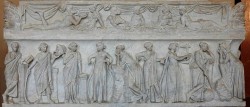
This is a love song to the power of the arts. It’s also a bit of a book review — in praise of a book so strong it will shatter your preconcieved notions and crack your heart open like an egg. It’s an ode to what books & paintings & sculpture & music & weavings & all the various forms art can take do to us. And it’s the story of now.
Cynthia Rankine, National Book Award finalist in both criticism and poetry (a first in the history of the 65-year-old institution), has a new book. Rankine’s work is never easy to read — not because you can’t undertand it; she’s neither obscure nor abstruse. You will know exactly what she’s thinking in her newest book, Citizen: An American Lyric. The book-length poem, as Rankine calls it, had me holding back tears of rage, horror, and that familiar sinking what were those people THINKING? feeling. In a fit of insanity, I read it on a plane, surrounded by people I’m pretty sure wouldn’t ‘get’ it.

via wikipedia
Because it’s a scathing, heart-breaking indictment of America. Specifically, WHITE America. Rankine lets no one off the hook, piling up anecdote after anecdote of the failure of her white colleagues, friends, & acquaintances to treat her (and others) with consideration instead of fear.
This is what the best art does: it changes the viewer/ reader/ listener/ observer. It leaves you breathless from beauty, or hyperventilating from horror and rage. But always, it changes things. In Rankine’s case, it gives me a context for Selena Williams’ outburst on the tennis court. It reminds me that as an engaged Buddhist, I have to be a vocal ally. I can’t sit back when people are hassled because they’re brown. I can’t remain quiet when black men & women are targeted from racist motives. The entire system is racist — that’s what the word racism means: a systemic bias for and against.

But as all great art does, Citizen presents us w/ this scenario in a form so powerful & eloquent we can’t pretend it doesn’t happen. Art this insistent is born from truth, even though that truth cuts like knives. So did the beating of Rodney King. So did the racial fear that drove the murder of Trayvon Martin. And so did the racial hatred that rejoiced in running down James Craig Anderson. As Rankine recounts the end of ordinary lives, in extraordinary pain, we can’t turn away.
Nor should we. Rankine’s case for the pain in her ordinary A(frican)merican life — and those of so many other African Americans — is compelling. We should not turn away.

